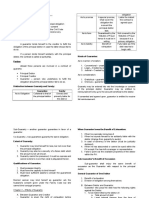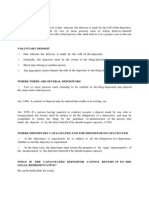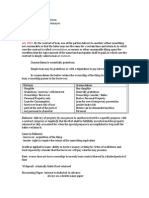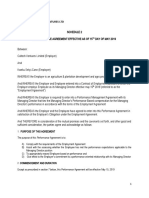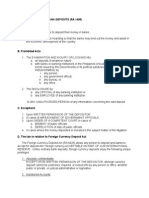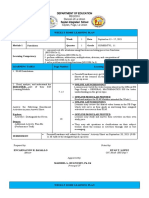0 ratings0% found this document useful (0 votes)
793 viewsObligations of The Depositary - Depositor
Obligations of The Depositary - Depositor
Uploaded by
Ruiy Delos Reyes1. The depositary is obligated to keep the deposited thing safely with the same diligence used for their own property and return it to the depositor or their heirs.
2. If authorized, the depositary may use the deposited thing but is liable for any damages or loss resulting from the use. For money deposits, the depositary must pay interest if they use the funds.
3. In the event of multiple solidary depositors, each depositor may demand their proportionate share of a divisible thing or the depositary may return the thing to any one depositor.
Copyright:
© All Rights Reserved
Available Formats
Download as DOCX, PDF, TXT or read online from Scribd
Obligations of The Depositary - Depositor
Obligations of The Depositary - Depositor
Uploaded by
Ruiy Delos Reyes0 ratings0% found this document useful (0 votes)
793 views3 pages1. The depositary is obligated to keep the deposited thing safely with the same diligence used for their own property and return it to the depositor or their heirs.
2. If authorized, the depositary may use the deposited thing but is liable for any damages or loss resulting from the use. For money deposits, the depositary must pay interest if they use the funds.
3. In the event of multiple solidary depositors, each depositor may demand their proportionate share of a divisible thing or the depositary may return the thing to any one depositor.
Original Description:
Obligations of the Depositary.depositor notes
Original Title
Obligations of the Depositary.depositor
Copyright
© © All Rights Reserved
Available Formats
DOCX, PDF, TXT or read online from Scribd
Share this document
Did you find this document useful?
Is this content inappropriate?
1. The depositary is obligated to keep the deposited thing safely with the same diligence used for their own property and return it to the depositor or their heirs.
2. If authorized, the depositary may use the deposited thing but is liable for any damages or loss resulting from the use. For money deposits, the depositary must pay interest if they use the funds.
3. In the event of multiple solidary depositors, each depositor may demand their proportionate share of a divisible thing or the depositary may return the thing to any one depositor.
Copyright:
© All Rights Reserved
Available Formats
Download as DOCX, PDF, TXT or read online from Scribd
Download as docx, pdf, or txt
0 ratings0% found this document useful (0 votes)
793 views3 pagesObligations of The Depositary - Depositor
Obligations of The Depositary - Depositor
Uploaded by
Ruiy Delos Reyes1. The depositary is obligated to keep the deposited thing safely with the same diligence used for their own property and return it to the depositor or their heirs.
2. If authorized, the depositary may use the deposited thing but is liable for any damages or loss resulting from the use. For money deposits, the depositary must pay interest if they use the funds.
3. In the event of multiple solidary depositors, each depositor may demand their proportionate share of a divisible thing or the depositary may return the thing to any one depositor.
Copyright:
© All Rights Reserved
Available Formats
Download as DOCX, PDF, TXT or read online from Scribd
Download as docx, pdf, or txt
You are on page 1of 3
OBLIGATIONS OF THE DEPOSITARY (ART o The depositor is liable for the loss of the thing
1972-1991) deposited under Article 1973 if:
a. He transfers the deposit with a third person
1. To keep the thing safely (Art 1972) without authority although there is no negligence
o Exercise over the thing deposited the same on his part and the third person;
diligence as he would exercise over his property b. he deposits the thing with a third person who is
2. To return the thing (Art 1972) manifestly careless or unfit although authorized
o Person to whom the thing must be returned: even in the absence of negligence, or
a. Depositor, to his heirs and successors, or the person c. the thing is lost through the negligence of his
who may have been designated in the contract employees whether the latter are manifestly
b. If the depositary is capacitated he is subject to all careless or not.
the obligations of a depositary whether or not the
depositor is capacitated. If the depositor is 4. If the thing deposited should earned interest (Art 1975):
incapacitated, the depositary must return the property a. to collect interest and the capital itself as it far
to the legal representative of the incapacitated or to due
the depositor himself if he should acquire capacity b. to take steps to preserve its value and rights
(Art 1970) corresponding to it
c. If the depositor is capacitated and the depositary 5. Not to commingle things deposited if so stipulated (Art
incapacitated the latter does not incur the obligation 1976)
of a depositary but he is liable:
i. to return the thing deposited while still in 6. Not to make use of the thing deposited unless
his possession; authorized (Art.1977)
ii. to pay the depositor the amount which he o GENERAL RULE: Deposit is for safekeeping of
may have benefited himself with the thing or its the subject matter and not for use. The
price subject to the right of any third person who unauthorized use by the depositary would make
acquired the thing in good faith (Art 1971) him liable for damages
o EXCEPTIONS:
Time of return; 1. When the preservation of the thing deposited
a. Upon demand even though a specified period requires its use
or time for such return may have been fixed 2. When authorized by the depositor
except when the thing is judicially attached while o NOTE: The permission to use is NOT presumed
in the depositary's possession or should he have except when such use is necessary for the
been notified of the opposition of a third person preservation of the thing deposited.
to the return or the removal of the thing deposited.
(Art 1998) Effect if permission to use is given (Art 1978):
b. i deposit gratuitous, the depositary may return 1. If thing deposited is non-consumable, the
the thing deposited notwithstanding that a period contract loses the character of a deposit and
has been fixed for the deposit if justifiable acquires that of a commodatum despite the fact
reasons exists for its return. that the parties may have denominated it as a
c. the deposit is for a valuable consideration; the deposit, unless safekeeping is still the principal
depositary has no right to return the thing purpose.
deposited before the expiration of the time 2. If thing deposited consists of money/
designated even if he should suffer inconvenience consumable things, the contract is converted into
as a consequence. (Art 1989) a simple loan or mutuum unless safekeeping is
What to return: product, accessories and still the principal purpose in which case it is
accessions of the thing deposited (Art 1983) called an irregular deposit. Example: bank
3. Not to deposit the thing with a third person unless deposits are irregular deposits in nature but
authorized by express stipulation (Art 1973) governed by law on loans.
7. When the thing deposited is delivered sealed and restitution until the
closed: time for payment, as
a. to return the thing deposited in the same provided in the
condition contract, has arisen
b. to pay for damages should the seal or lock be 2. The only benefit is 2. Essential cause for
broken through his fault, which is presumed that which accrues the transaction is the
unless proved otherwise to the depositor necessity of the
c. to keep the secret of the deposit when the seal borrower
o lock is broken with or without his fault (Art. 3. The irregular 3. Common creditors
1981) depositor has a enjoy no preference
o NOTE: The depositary is authorized to open the preference over in the distribution of
thing deposited which is closed and sealed when other creditors with the debtor's
(Art 1982): respect to the thing property
i. there is presumed authority (i.e. when the key deposited
has been delivered to him or the instructions of
the depositor cannot be done without opening it)
ii. necessity Rule when there are two or more depositors (Art
8. To change the way of the deposit if under the 1985):
circumstances, the depositary may reasonably presume 1. If thing deposited is divisible and depositors
that the depositor would consent to the change if he knew are not solidary: Each depositor can demand only
of the facts of the situation, provided, that the former his proportionate share thereto.
notifies the depositor thereof and wait for his decision, 2. If obligation is solidary or if thing is not
unless delay would cause danger divisible: Rules on active solidarity shall apply,
i.e. each one of the solidary depositors may do
9. To pay interest on sums converted to personal use if the whatever may be useful to the others but not
deposit consists of money (Art 1983) anything which may be prejudicial to the latter,
(Art. 1212) and the depositary may return the
10. To be liable for loss through fortuitous event (SUDA): thing to anyone of the solidary depositors unless
(Art 1979): a demand, judicial or extrajudicial, for its return
a. if stipulated has been made by one of them in which case,
b. if he uses the thing without the depositor's delivery should be made to him (Art. 1214).
permission 3. Return to one of depositors stipulated. The
c. if he delays its return depositary is bound to return it only to the person
d. if he allows others to use it, even though he designated although he has not made any demand
himself may have been authorized to use the same for its return.
o NOTES: o NOTES:
Fixed, savings, and current deposits of The depositary may retain the thing in
money in banks and similar institutions shall pledge until full payment of what may be
be governed by the provisions concerning due him by reason of the deposit (Art
simple loan. (Art 1980) 1994).
The general rule is that a bank can The depositor's heir who in good faith
compensate or set off the deposit in its hands may have sold the thing which he did not
for the payment of any indebtedness to it on know was deposited, shall only be bound
the part of the depositor. In true deposit, to return the price he may have received
compensation is not allowed. or to action his right of action against the
buyer in case the price has not been paid
1. The consumable 1. Lender is bound
him (Art 1991)
ting deposited may by the provisions of
be demanded at will the contract and
by the depositor cannot demand
OBLIGATIONS OF THE DEPOSITOR (ART 1992-
1995)
1. To pay expenses for preservation
a. If the deposit is gratuitous, the depositor is
obliged to reimburse the depositary for expenses
incurred for the preservation of the thing
deposited (Art 1992)
b. If the deposit is for valuable consideration,
expenses for preservation are borne by the
depositary unless there is a contrary stipulation
2. To pay loses incurred by the depositary due to the
character of the thing deposited
o GENERAL RULE:
The depositor shall reimburse the depositary for
any loss arising from the character of the thing
deposited.
o EXCEPTIONS:
1. at the time of the deposit, the depositor was not
aware of the dangerous character of the thing.
2. when depositor was not expected to know the
dangerous character of the thing force.
3. when the depositor notified the depository of
the same
4. the depositary was aware of it without advice
from the depositor
You might also like
- The Full Rory Gilmore Reading ChallengeDocument11 pagesThe Full Rory Gilmore Reading Challengedesny575% (4)
- Credit Notes GuarantyDocument3 pagesCredit Notes GuarantyRyan Suaverdez100% (1)
- Truth in Lending Act CASE DIGESTSDocument5 pagesTruth in Lending Act CASE DIGESTSkeouhNo ratings yet
- Guaranty ReviewerDocument3 pagesGuaranty ReviewerNikki Andrade100% (3)
- Week 2 G. Contract of Commodatum Essentially GratuitousDocument15 pagesWeek 2 G. Contract of Commodatum Essentially GratuitousDANICA FLORES100% (1)
- Quiz 1 - Business CombiDocument6 pagesQuiz 1 - Business CombiKaguraNo ratings yet
- CMRF FundDocument3 pagesCMRF FundLovely ChetanNo ratings yet
- The Catcher in The Rye and Romeo and Juliet Comparison EssayDocument4 pagesThe Catcher in The Rye and Romeo and Juliet Comparison EssayShakilMirzaNo ratings yet
- Voluntary DepositDocument13 pagesVoluntary DepositJohn Michael Babas100% (1)
- Deposit in General and Its Different Kinds (Art 1962-1967)Document11 pagesDeposit in General and Its Different Kinds (Art 1962-1967)Lo100% (1)
- Pledge and AntichresisDocument6 pagesPledge and AntichresisroansalangaNo ratings yet
- BP22 ReviewerDocument2 pagesBP22 ReviewerNicky ChrisNo ratings yet
- Republic Act No. 6426: Foreign Currency Deposit Act of The PhilippinesDocument14 pagesRepublic Act No. 6426: Foreign Currency Deposit Act of The PhilippinesJazib ZainabNo ratings yet
- TOPIC 1: PDIC LAW (RA 3591, Amended by RA 7400, 9302 and 9576)Document3 pagesTOPIC 1: PDIC LAW (RA 3591, Amended by RA 7400, 9302 and 9576)Christine JotojotNo ratings yet
- Nature and Extent of GuarantyDocument5 pagesNature and Extent of GuarantyNikka GloriaNo ratings yet
- Difference Commodatum v. MutuumDocument3 pagesDifference Commodatum v. MutuumAnjung Manuel CasibangNo ratings yet
- RFBT.04 Law On Credit TransactionDocument2 pagesRFBT.04 Law On Credit TransactionRhea Royce CabuhatNo ratings yet
- PledgeDocument9 pagesPledgeLaarni Aragon100% (1)
- Credit Transaction Midterm ReviewerDocument7 pagesCredit Transaction Midterm ReviewerCarl MontemayorNo ratings yet
- Republic Act No. 3591 Philippine Deposit Insurance CorporationDocument42 pagesRepublic Act No. 3591 Philippine Deposit Insurance CorporationJomer FernandezNo ratings yet
- Preference of CreditDocument2 pagesPreference of CreditMartin EspinosaNo ratings yet
- Assignment NegoDocument10 pagesAssignment Negomelbertgutzby vivasNo ratings yet
- Liquidation Based Valuation 03.06.2023Document6 pagesLiquidation Based Valuation 03.06.2023Ivan Jay E. EsminoNo ratings yet
- Kaizen BuildersDocument21 pagesKaizen Buildersayesha jaafarNo ratings yet
- Chapter5TrustandEstate Exerciseslumbera LalusinDocument12 pagesChapter5TrustandEstate Exerciseslumbera Lalusinjay-r Gutierrez100% (1)
- Handouts Gross EstateDocument2 pagesHandouts Gross Estateonlineonrandomdays100% (1)
- Maris CorporationDocument2 pagesMaris CorporationmageNo ratings yet
- Pledge Provisions Common To Pledge and Mortgage (Common Provisions), Articles 2085-2092Document14 pagesPledge Provisions Common To Pledge and Mortgage (Common Provisions), Articles 2085-2092Gideon Salino Gasulas Buniel100% (1)
- FARAP 4509 Trade Payable, Provisions Other Current LiabilitiesDocument11 pagesFARAP 4509 Trade Payable, Provisions Other Current Liabilitieskyhn.beycaNo ratings yet
- GR 187581Document4 pagesGR 187581SabNo ratings yet
- Antichresis Case DigestDocument26 pagesAntichresis Case DigestChristine RozulNo ratings yet
- CHAPTER 4, SEC. 5 (Arts. 1278-1290)Document11 pagesCHAPTER 4, SEC. 5 (Arts. 1278-1290)Kate HizonNo ratings yet
- Salient Features of Philippine Deposit Insurance Corporation (PDIC) - Republic Act 3591Document6 pagesSalient Features of Philippine Deposit Insurance Corporation (PDIC) - Republic Act 3591Mycah AliahNo ratings yet
- SPL ReviewerDocument6 pagesSPL Reviewerapril75No ratings yet
- Republic Act No 10607Document7 pagesRepublic Act No 10607Romel TorresNo ratings yet
- 'Quia Contracts 8' PDFDocument15 pages'Quia Contracts 8' PDFmary_altheneNo ratings yet
- Article 1815Document1 pageArticle 1815Alexandria Evangelista100% (1)
- PledgeDocument2 pagesPledgeKellNo ratings yet
- Discuss The Components and Characteristics of Maximization and Minimization ModelDocument5 pagesDiscuss The Components and Characteristics of Maximization and Minimization ModelNicole AutrizNo ratings yet
- Guaranty & Suretyship: Chapter 1-Nature & Extent of Guaranty #2047Document8 pagesGuaranty & Suretyship: Chapter 1-Nature & Extent of Guaranty #2047Zyra C.No ratings yet
- Dela Cruz Vs Asian ConsumerDocument5 pagesDela Cruz Vs Asian ConsumerMarion Yves MosonesNo ratings yet
- Article 1828-1867Document5 pagesArticle 1828-1867ChaNo ratings yet
- Lozano v. Martinez, 146 SCRA 324Document14 pagesLozano v. Martinez, 146 SCRA 324ela kikayNo ratings yet
- TILADocument1 pageTILACJ IbaleNo ratings yet
- Civil Obligations Arise From Law, Contracts, Quasi-Contracts, Delicts and Quasi-DelictsDocument6 pagesCivil Obligations Arise From Law, Contracts, Quasi-Contracts, Delicts and Quasi-DelictsShairuz Caesar Briones DugayNo ratings yet
- Subject: Degree of Diligence Required From Banks in Dealing With Its Clients & DepositsDocument2 pagesSubject: Degree of Diligence Required From Banks in Dealing With Its Clients & DepositsLuke VerdaderoNo ratings yet
- Performance AgreementDocument3 pagesPerformance AgreementAnita WilliamsNo ratings yet
- Dissolution and Winding UpDocument110 pagesDissolution and Winding UpHahajaijaNo ratings yet
- Chapter09 - Answer PDFDocument21 pagesChapter09 - Answer PDFAvon Jade RamosNo ratings yet
- Article 1495 - 1506Document2 pagesArticle 1495 - 1506MarkNo ratings yet
- Law On Secrecy of Bank DepositsDocument2 pagesLaw On Secrecy of Bank DepositsMan HernandoNo ratings yet
- Law On Business OrganizationDocument2 pagesLaw On Business OrganizationsharaNo ratings yet
- Chapter 20 Ia2Document24 pagesChapter 20 Ia2JM Valonda Villena, CPA, MBANo ratings yet
- Financial Rehabilitation and Insolvency Act of 2010: (R.A. No.10142)Document11 pagesFinancial Rehabilitation and Insolvency Act of 2010: (R.A. No.10142)gilbert213No ratings yet
- Joint and Solidary Liability Mini ReviewerDocument4 pagesJoint and Solidary Liability Mini ReviewerRobinson FloresNo ratings yet
- Module 5-InvestmentsDocument27 pagesModule 5-InvestmentsJane Clarisse SantosNo ratings yet
- Philippine Deposit Insurance Corporation (Ra 3591)Document19 pagesPhilippine Deposit Insurance Corporation (Ra 3591)mtabcao100% (1)
- Simple Loan or MutuumDocument54 pagesSimple Loan or MutuumNoreenesse SantosNo ratings yet
- Liability For Loss. - Under Article 1973, The Depositor Is Liable For TheDocument4 pagesLiability For Loss. - Under Article 1973, The Depositor Is Liable For TheGabrielle DayaoNo ratings yet
- Credit Transaction: RD RDDocument4 pagesCredit Transaction: RD RDaya5monteroNo ratings yet
- Deposits Notes CreditDocument7 pagesDeposits Notes CreditMa. Goretti Jica GulaNo ratings yet
- Notes On Contract of DepositDocument6 pagesNotes On Contract of DepositBJ SoilNo ratings yet
- General PresentationDocument22 pagesGeneral PresentationDANICA FLORESNo ratings yet
- WILLS - Opulencia v. CADocument1 pageWILLS - Opulencia v. CAJenn DenostaNo ratings yet
- 5.1.1 - The Wizard of Oz - Reading Activity IdeasDocument1 page5.1.1 - The Wizard of Oz - Reading Activity IdeasAshiq Jahan KhondkerNo ratings yet
- DLL Mathematics 5 q2 w6Document7 pagesDLL Mathematics 5 q2 w6elizea mojicaNo ratings yet
- Matthew Flinders (Editor), Andrew Gamble (Editor), Colin Hay (Editor), Michael Kenny (Editor) - The Oxford Handbook of British Politics (Oxford Handbooks) - Oxford University Press (2009)Document1,002 pagesMatthew Flinders (Editor), Andrew Gamble (Editor), Colin Hay (Editor), Michael Kenny (Editor) - The Oxford Handbook of British Politics (Oxford Handbooks) - Oxford University Press (2009)Ronan McNabbNo ratings yet
- IFS Standards Product FraudDocument50 pagesIFS Standards Product FraudLong Beautéophile100% (1)
- Special OlympicsDocument26 pagesSpecial OlympicsLeoNo ratings yet
- DLL Stats IsoDocument3 pagesDLL Stats IsoMissEu Ferrer MontericzNo ratings yet
- Replacement and Retention Decisions: Gra W HillDocument101 pagesReplacement and Retention Decisions: Gra W HillalfaselNo ratings yet
- Case Study Report (Peptic Ulcer) Group 1Document9 pagesCase Study Report (Peptic Ulcer) Group 1Khrizlynne SoberanoNo ratings yet
- Sample Resignation LetterDocument3 pagesSample Resignation LettermirfanjpcgmailcomNo ratings yet
- Lesson-Reference OC11 1stMT WK1Document16 pagesLesson-Reference OC11 1stMT WK1rte9566No ratings yet
- Department of Education Region I Division of La Union Saytan Integrated School Saytan, Pugo, La UnionDocument9 pagesDepartment of Education Region I Division of La Union Saytan Integrated School Saytan, Pugo, La UnionencarNo ratings yet
- Legitimacy in African Politics: Neo-Patrimonialism, Personal Rule and The Centralisation of The African StateDocument10 pagesLegitimacy in African Politics: Neo-Patrimonialism, Personal Rule and The Centralisation of The African StatestefanNo ratings yet
- 27 Top Freedom Bible Verses - Scripture About Being Free!Document6 pages27 Top Freedom Bible Verses - Scripture About Being Free!Daion MarshallNo ratings yet
- 02 PhysiologusDocument22 pages02 PhysiologusshoubenNo ratings yet
- United States For America Moorish National Republic Federal GovernmentDocument2 pagesUnited States For America Moorish National Republic Federal Governmentakil kemnebi easley elNo ratings yet
- Specific Features of The Decathlon PDFDocument5 pagesSpecific Features of The Decathlon PDFBrandy MaloneNo ratings yet
- BFA Mock Test Match The Words To Their DefinitionsDocument3 pagesBFA Mock Test Match The Words To Their DefinitionsMaríaNo ratings yet
- Topic 1 Problem Set 2016Document5 pagesTopic 1 Problem Set 2016Aayesha TariqNo ratings yet
- Cursus Bouwfysica2 Bouwknopen AkoestiekDocument163 pagesCursus Bouwfysica2 Bouwknopen AkoestiekBoreirNo ratings yet
- Elite: All Short StoriesDocument38 pagesElite: All Short StoriesaltNoctsNo ratings yet
- Vectors Ws PDFDocument2 pagesVectors Ws PDFJose Barrera GaleraNo ratings yet
- Ansi/Aiha Z10: Atomic NumberDocument11 pagesAnsi/Aiha Z10: Atomic NumberRehman MuzaffarNo ratings yet
- George Adamski: The Story of A UFO ContacteeDocument39 pagesGeorge Adamski: The Story of A UFO ContacteeScooterKatNo ratings yet
- LIMIT Theorems: (MAT060 - Calculus With Analytic Geometry I)Document20 pagesLIMIT Theorems: (MAT060 - Calculus With Analytic Geometry I)Love RosieeNo ratings yet
- Life and Works of Rizal This File Is Complete From Prelim Lectures Up To Final Lectures Thank YouDocument33 pagesLife and Works of Rizal This File Is Complete From Prelim Lectures Up To Final Lectures Thank YouRienheart Maderse Gaborno DjkrustyNo ratings yet
- Ux Foundation Specimen PaperDocument13 pagesUx Foundation Specimen PaperalissmayoloweNo ratings yet



